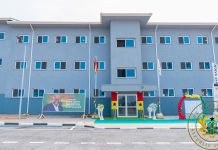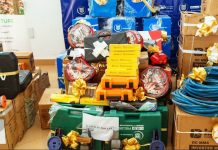The Deputy Minister for Lands and Natural Resources in charge of mining, George Mireku Duker, has disclosed that 200 River Guards would be recruited this year, and placed permanently on our water bodies to fight illegal mining.
Additionally, five speed boats had been procured to aid the work of these River Guards. Though he did not mention the river bodies where the River Guards would be stationed, it is believed rivers like Ankobra, Pra, and Butre would be given priority.
Addressing the media at Tarkwa, the Deputy Minister emphasised that his Ministry and the government were not against legitimate small scale mining, and that what they were fighting was illegal mining which destroyed the river bodies.
George Mireku Duke said the pollution of our water bodies had dire consequences on the health of Ghanaians, and that the Ministry would do everything within its power to end the illegal trade.
In the Western Region, rivers like the Ankobra, Pra, Butre and others had turned brownish as a result of illegal mining.
The Deputy Lands and Natural Resource Minister, however, hinted that this year the Ministry had plans to audit all mining firms in the county, with the view to tracking all heavy duty equipment, particularly, excavators, used by mining companies.
According to him, a special device would be embossed on all registered excavators belonging to the large scale mining firms to enable the Mineral Commission track every equipment moving out of a particular mining concession.
With the device, the Deputy Minister explained to journalists that it would be impossible for mining equipment to be move out of a particular concession to another without permission from the Mineral Commission.
On community mining, the Deputy Minister advocated for the large scale mining firms to meet government half way, by way of ceding part of their concessions to the government.
The advocacy followed a question posed by this reporter on why part of a mining concession belonging to Ghana Rubber Estate Limited (GREL), a company in the Western Region, was forcibly taken and de-assigned for community mining despite strong opposition from the company.
The Deputy Minister told this reporter that the said concession was recommended by the Mineral Commission for community mining, and that since the miners were not undertaking surface mining, he did not see why GREL should oppose the use of the concession.
On reports that a mining concession belonging to Tursk Mining had also been forcefully taken over by government for community mining at Akoon in Tarkwa, the Deputy Minister responded in the opposite.
According to him, it was not correct that government forcibly took over the concession of the said mining firm in the name of community mining.
The Minister explained that at the time government took over the concession, Tursk Mining had failed to renew its license.
He said there was competition in the registration and renewal of licenses for concessions, and that since Tursk Mining failed to renew its license, it was deemed that they were not interested in the concession again.
So Akoon Community Mining applied for the concession, and the concession was documented in its name.
According to him, this was not the first time a concession had been taken and handed over to another company, and that Tursk Mining also took over the concession from another firm that failed to renew its license.
He said the concession in question was not a virgin one, and that it had been in existence since 1936.
He warned that if Akoon Mining also failed to renew its license when it expired, another company could also take over after applying for it.









